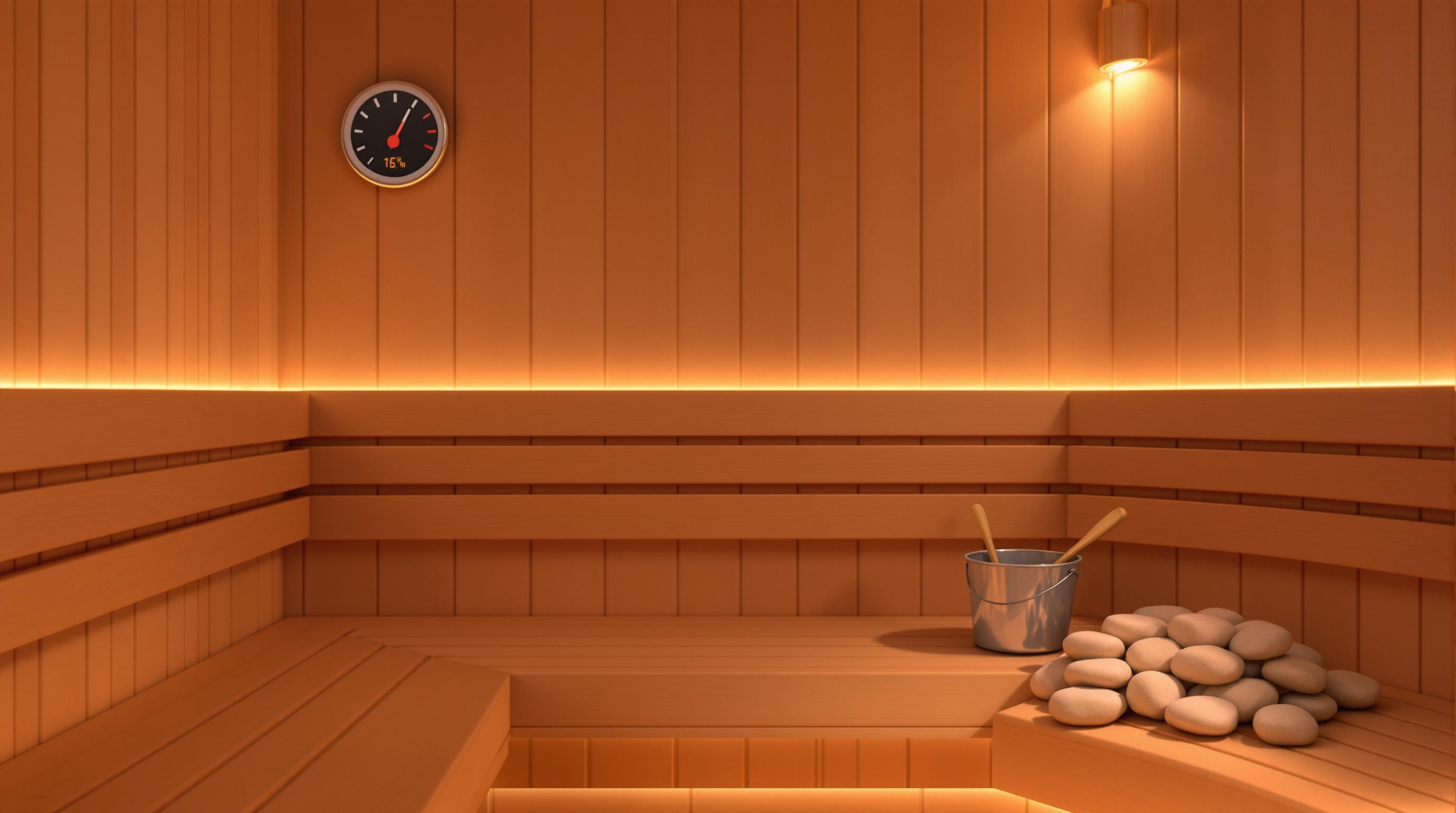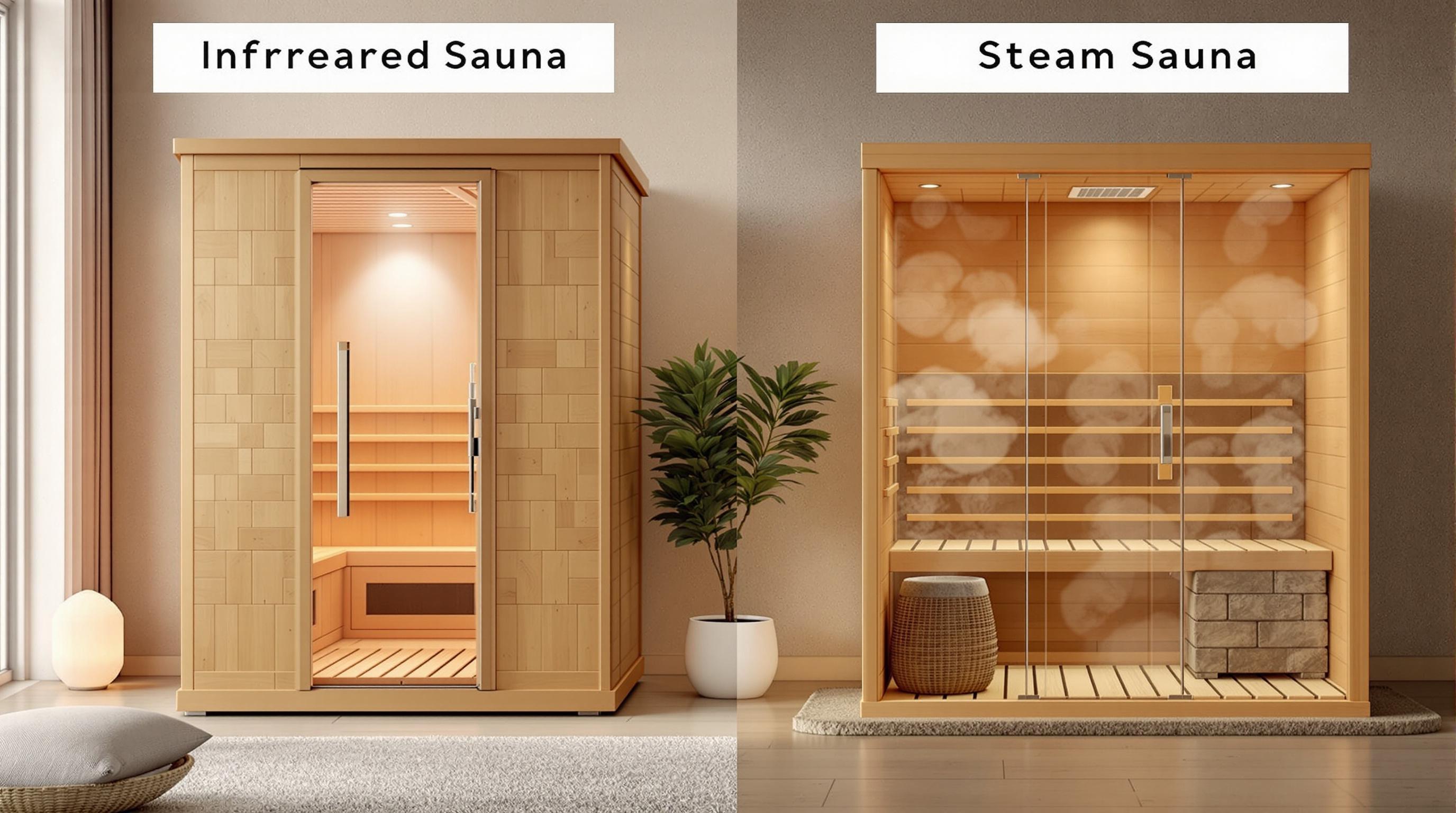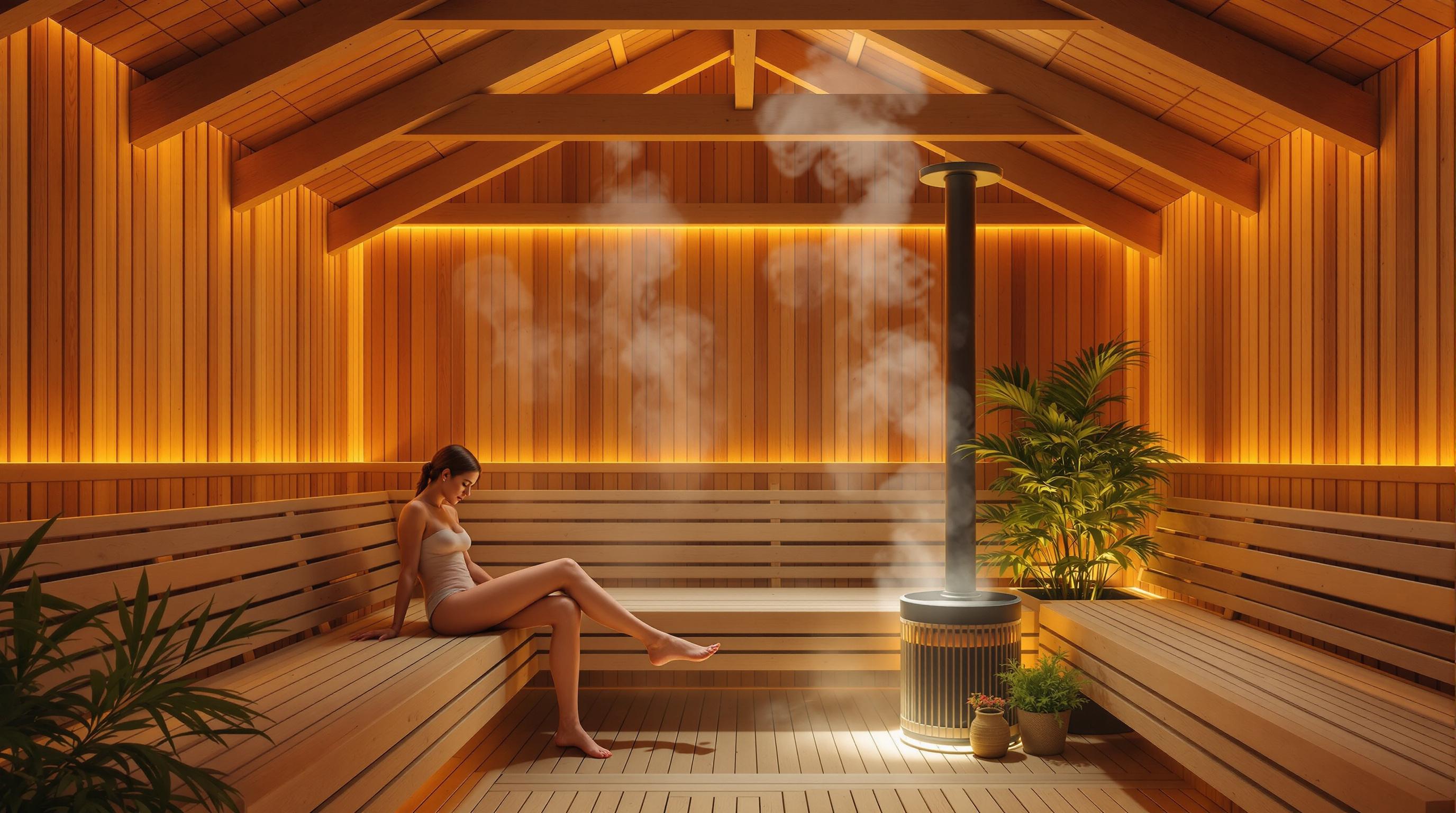Saunas can help you sleep better. They relax your body, reduce stress, and promote deeper, restorative sleep by syncing with your natural sleep cycles. Here's a quick summary of how saunas enhance sleep:
- Relaxation: Heat eases muscle tension and lowers stress hormones.
- Stress Relief: Regular sessions reduce cortisol, helping you feel calm.
- Improved Circulation: Better blood flow supports relaxation and sleep prep.
- Temperature Regulation: Cooling down after a sauna aligns with your circadian rhythm.
- Deeper Sleep: Studies show saunas boost deep sleep by up to 70%.
For best results, use a sauna 1-2 hours before bed, keep sessions to 15-30 minutes, and stay hydrated. Saunas are a natural and effective way to improve sleep quality.
Can A Sauna Help You Sleep Better?
1. Helps You Relax
Saunas provide a calming space that helps you unwind both physically and mentally, making it easier to drift into quality sleep. Studies suggest that sauna heat therapy encourages relaxation, which is key for preparing your body for restful sleep [1].
The heat from a sauna works to relax your muscles and ease physical tension. Infrared saunas, in particular, deliver heat that penetrates deeply, targeting muscles and joints for relief [1]. This physical relaxation pairs with stress reduction - research shows that regular sauna use can lower cortisol levels, promoting a sense of calm that's perfect for winding down [1]. Plus, the peaceful atmosphere of a sauna encourages mindfulness, helping you let go of daily stress.
Evening sauna sessions can significantly improve deep sleep, allowing your body to experience restorative rest [4]. To get the most out of this, try scheduling your sauna time 1-2 hours before bed [3]. Start with shorter, 15-minute sessions and gradually work up to 30 minutes as your body becomes accustomed to the heat.
"Regular sauna sessions, when integrated into your evening routine, can create a powerful relaxation trigger that helps prepare your body for sleep."
In addition to helping you relax, saunas address one of the biggest obstacles to good sleep: stress.
2. Reduces Stress Levels
Sauna sessions are an effective way to ease stress, which can directly improve sleep. The heat encourages the release of endorphins - your body's natural feel-good chemicals - that help counteract daily tension and get you ready for a peaceful night. Plus, regular sauna use has been shown to lower cortisol levels, the hormone linked to stress. In fact, a 12-week study highlighted that consistent sauna sessions significantly reduced cortisol, leading to deeper relaxation [1].
For the best results, aim for 15-30 minute sessions about 1-2 hours before bedtime. Make sure to stay hydrated and consider adding light stretches to boost the sauna's calming effects [2].
"Sauna heat lowers stress hormones, fostering calm and relaxation essential for sleep" [1].
On top of reducing stress, saunas improve blood circulation, which further aids in achieving restful sleep.
3. Boosts Blood Circulation
Sauna heat therapy improves blood flow throughout your body, offering effects similar to light exercise. This increased circulation helps you relax and supports your body's natural cooling process, which plays a key role in preparing for sleep.
Circulation and Sleep
The heat from a sauna promotes better blood flow by delivering oxygen and nutrients to your tissues, which helps your body unwind and get ready for sleep [1]. A 15-20 minute session causes blood vessels to widen, improving circulation and lowering blood pressure [1][4]. These effects continue even after you step out of the sauna, aiding the cooling process needed to fall asleep.
Using a sauna regularly can also improve deep sleep, which is essential for recovery and maintaining healthy sleep patterns [4]. By encouraging both improved circulation and relaxation, saunas create the perfect conditions for a good night's rest.
"Saunas mimic light exercise, improving circulation and triggering melatonin release for deep sleep."
In addition to boosting circulation, saunas help regulate body temperature, another important factor in preparing your body for quality sleep.
sbb-itb-3953eb0
4. Balances Body Temperature
Saunas do more than just boost circulation - they also help regulate body temperature, which plays a big role in sleep quality. This temperature regulation process sets the stage for better rest.
How Heat Therapy Helps
Spending time in a sauna raises your core temperature by 1–2°C. This rise kickstarts sleep-friendly effects that continue even after your session ends [1].
Cooling Down and Sleep Prep
After leaving the sauna, your body naturally cools down, which is a key part of getting ready for sleep. This cooling process aligns with your body's circadian rhythm [4].
"The decrease in body temperature after a sauna session triggers a sleep-inducing response by signaling the brain to rest. This process helps regulate the body's circadian rhythms and prepares the body for a restful night's sleep" [1][3].
Boosting Deep Sleep
Studies back up the benefits of using a sauna in the evening. One study showed that 83% of regular sauna users experienced better sleep quality, with evening sessions increasing deep sleep by 70% during the first two hours [4].
For the best results, try a traditional Finnish or infrared sauna at 150°F–200°F for 15–20 minutes per session [1][4].
5. Encourages Deeper Sleep
Using a sauna regularly can greatly improve sleep quality, especially by helping you achieve deeper and more restorative sleep. Research indicates that consistent sauna sessions can positively influence your sleep patterns.
How Heat Therapy Helps
Infrared sauna heat prepares your body and mind for rest. Studies suggest that sauna use can boost deep sleep by up to 70% during the first two hours and gradually extend the restorative sleep phases over time [4].
Supporting Better Sleep
Saunas help reduce stress hormones like cortisol while promoting relaxation, creating an ideal setting for deeper sleep [1]. The combination of stress reduction and heat therapy works together to improve deep sleep, which is essential for proper rest.
"Both dry and steam saunas encourage relaxation and mindfulness, calming the mind for easier sleep" [6].
Experts suggest maintaining a consistent 12-week sauna routine to regulate sleep patterns and fully enjoy its benefits [1]. With stress relief, relaxation, and improved sleep cycles, saunas provide a well-rounded way to enhance sleep quality.
Conclusion
Science backs the use of saunas for improving sleep, largely due to the physiological changes they trigger. Regular sessions boost blood circulation, aiding the release of hormones like melatonin, which supports restful sleep [1][4]. When used consistently, saunas can become an effective part of a sleep-enhancing routine.
Studies show that sauna use can increase deep sleep stages by more than 70% in the first two hours [4]. This improvement comes from reduced stress, enhanced circulation, and better temperature regulation. These factors work together to promote higher-quality sleep.
Owning a home sauna can make it easier to stick to a routine. Resources like Find the Home Sauna of Your Dreams can help you select the right fit for your lifestyle. Timing is crucial - experts suggest scheduling sessions one to two hours before bedtime [5]. This allows your body to cool naturally, signaling to your brain that it's time to wind down.
"Both dry and steam saunas encourage relaxation and mindfulness, calming the mind for easier sleep" [6].
FAQs
Does sauna improve sleep quality?
Yes, saunas can help with sleep by encouraging relaxation, lowering stress levels, and aiding your body's natural temperature regulation. These factors work together to prepare you for a more restful night's sleep. In fact, studies reveal that 83% of regular sauna users notice better sleep quality [1][4].
What is the best sauna protocol for sleep?
To maximize sleep benefits, try using a sauna 1-2 hours before bedtime. Keep the temperature around 176°F (80°C) and limit your session to about 20 minutes. Aim for 3-4 sessions per week, and make sure to stay hydrated before and after [1][3]. This approach aligns with your body's natural sleep rhythms, helping you rest more effectively.
"Both dry and infrared saunas can help improve sleep quality. Infrared saunas use gentle heat to penetrate deeper into the body, while traditional saunas provide benefits by promoting a natural cooling effect once the session is complete" [1][4].
If you're thinking about incorporating sauna use into your sleep routine, start slowly and pay close attention to how your body reacts. It's always a good idea to check with a healthcare provider beforehand, especially if you have any existing health concerns [2][3].


